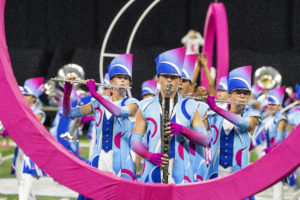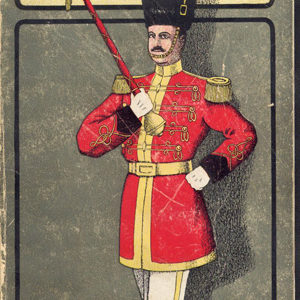The strength of the Broken Arrow band program, as told through the eyes of an alum, lies within each member and throughout the community.
Article sponsored by DeMoulin Brothers and Company
Pink dresses rippled and bare hands gracefully fell to the field as a melody with a mesmerizingly simple contour highlighted the movement. The Broken Arrow (Oklahoma) High School color guard members were the silent stars that opened what would become a record-breaking show. They projected a poignant presence that, especially after a difficult 15 months, was just enchanting.
The Pride of Broken Arrow won the 2021 Bands of America (BOA) Grand National Championships—its fourth overall victory—in Indianapolis, Indiana. Its score of 98.25 was the highest in BOA history.
Watching from high up in section 539, I noticed the crowd’s silence during Broken Arrow’s show. At my sixth Grand Nationals, I attended to watch my brother, a senior playing marimba in the front ensemble, and also tried to catch up with my parents between their chaperone duties. In addition, I was reliving my own experiences as a musician in the group; I had graduated in 2016.
Thinking about my family’s chapter with the band coming to a close, I found myself reflecting on what all of us, Pride alumni and volunteers alike, learn through our tenures with the organization. Because the work that really makes this group special doesn’t fit into award captions. It can’t be reflected in scores.
The Pride Creed

“For the strength of the pride is the member, and the strength of the member is the pride.”
These are the last two lines of the Pride’s creed, which was adapted from an excerpt from “The Jungle Book.” Students and staff recite these words at the end of every rehearsal or event, and they encapsulate one of the group’s main motivators, according to Darrin Davis, director of bands, and Dr. Kelli Pence, associate director of bands.
“It’s about giving of yourself for something that’s bigger than you are, and that’s a life lesson that our students are going to carry with them for a long time,” Davis says.
I had spoken the creed hundreds of times through my four years in Pride. Since then, its meaning has only grown, especially through real-world opportunities to give rather than to receive. Part of the creed’s message is that every student (and everyone) matters, from the ultra-charismatic section leader who might be a member of Congress someday to the kid who still isn’t sure they can make it through the rehearsals.
The directors say that the 2021 seniors lived out the creed’s lesson through a 2020 season that, aside from a single performance outside a nursing home, took place exclusively on their home field. “They showed up, they worked, they did their job to continue the tradition,” Pence says. “They gave, so that this year could happen. Those kids personified everything we try to teach.”
Many of those former members even made the trip to Grand Nationals in support of their peers. “That’s the biggest secret to this year’s success,” Davis says. “Last year’s senior class wasn’t going to let anything change about our culture.”
The Edge of Eternity

Broken Arrow’s 2021 show, “The Edge of Eternity”—with the second “E” backward—was open-ended. The music wasn’t instantly recognizable. The visuals were abstract and artistic, especially after several lighter, fun-oriented shows in prior years. “We wanted to give the audience freedom to create their own interpretations of what the show was about,” Davis says.
The responses to the show were unique and intimate. Judges commented that the performances were organic. One director mentioned remembrance. Parents expressed hope. I wonder if the show was simply an opportunity to reflect, an invitation to feel, after so much hardship.
The production featured cinematic music from Los Angeles composers, a harpsichord concerto by Henryk Górecki, and a piano and string octet called “Grace” by Arturo Cardelús. “There was something about hearing [‘Grace’] for the first time that was really emotional, and it became the inspiration for the show,” Davis says.
Overall, the music conveyed a sense of cyclic balance echoed by visual motifs like circles, rotation, and symmetry through the props, costuming, and drill. “I think it was mid-season that we started seeing signs that the show could turn into something really special,” Davis says.
The momentum continued.
The directors say that their best groups have been the ones who have traveled to Grand Nationals and raised their performance standard through three shows and a few short rehearsals. The 2021 group, with only 24 Grand National veterans, surpassed their expectations, they add. “The goal is that your last show is your best,” Pence says. “But they took it to another level. The kids were hungry. They understood more than any other class what it meant not to take anything for granted.”
The Pride of the Community
Upon the Pride’s return after the trip to Grand Nationals, the Broken Arrow police and fire department escorted the band’s buses to the high school, where a crowd of cheering, sign-holding friends, family, and community members waited.
Broken Arrow, Oklahoma, is a town with about 100,000 residents, and they love the Pride. Before the trip, more than 5,000 people attended the band’s send-off performance, an event they used as a food drive to support a local pantry. They accumulated more than 10,000 pounds of food that night.
Pride bumper stickers are hard to miss as residents drive around town. The huge network of Pride alumni spans decades and may give the Six Degrees of Kevin Bacon a run for its money. “We’ve got the largest high school in Oklahoma, yet there’s this feeling of small-town camaraderie throughout the community,” Davis says. “You can’t go anywhere without running into someone. I’ll even be working in my yard, and someone will drive by and say, ‘Congratulations!’”
The directors say the Pride couldn’t operate without school administrators who recognize the importance of the arts, volunteers from grandparents to alumni who give their talent and time, and students who are committed to showing up ready for a challenge. They’re all a part of the Pride’s culture of giving for the greater good. That culture doesn’t just create champions. It helps form good people.



